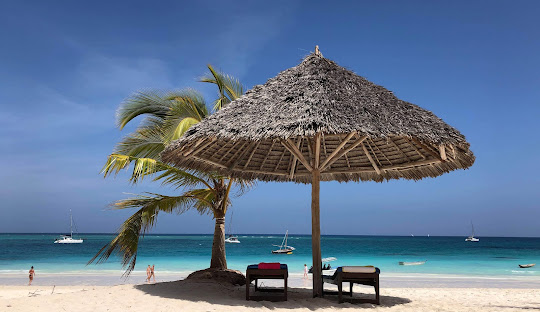Zanzibar, Tanzania
🏝️ Zanzibar, Tanzania – The Spice Island of Dreams
Overview:
Zanzibar is an archipelago in the Indian Ocean, just off the coast of mainland Tanzania, best known for its pristine beaches, vibrant Swahili culture, and UNESCO-listed Stone Town. With its blend of African, Arab, Indian, and European influences, Zanzibar offers a travel experience that is both exotic and relaxing, making it ideal for beachgoers, history buffs, and adventure seekers alike.
🌟 Top Attractions & Experiences
🏰 Stone Town (UNESCO World Heritage Site)
The historic heart of Zanzibar City, Stone Town is a maze of narrow alleyways, bustling markets, ancient mosques, and coral stone buildings. Highlights include:
-
House of Wonders (Beit-al-Ajaib) – Once a sultan’s palace, now a museum showcasing Swahili and Zanzibari culture.
-
Old Fort – A 17th-century fort that now hosts cultural performances and craft shops.
-
Freddie Mercury House – The childhood home of Queen’s legendary frontman, open to fans and the curious.
-
Darajani Market – A vibrant local market where you can shop for spices, textiles, and street food.
🌊 Nungwi & Kendwa Beaches
The northern beaches of Zanzibar, especially Nungwi and Kendwa, are known for their powdery white sand, clear blue waters, and lively beach scenes. Nungwi is popular for its resorts and nightlife, while Kendwa is famous for its Full Moon Party and excellent swimming regardless of the tide.
🐠 Snorkeling & Diving in Mnemba Atoll
The coral reefs surrounding Mnemba Island, off the northeast coast, are some of the best in East Africa. Here, you can dive or snorkel alongside dolphins, turtles, moray eels, and vibrant coral gardens. Many tour operators in Nungwi and Matemwe offer half-day or full-day excursions.
🌿 Spice Tours
Known as the "Spice Island", Zanzibar has long been a center for clove, nutmeg, cinnamon, and black pepper production. Guided spice farm tours allow you to walk through plantations, learn about medicinal plants, and enjoy fresh fruits and aromatic experiences.
🐬 Dolphin Watching in Kizimkazi
Located on the southern coast, Kizimkazi is a fishing village known for its dolphin-watching tours. While sightings are common, it's important to choose eco-conscious operators that respect marine life. Some tours also allow swimming near dolphins (though ethical concerns apply).
🛖 Jozani Forest Reserve
Home to the endemic red colobus monkey, the Jozani Forest is the island’s only national park. A guided walk through this tropical forest reveals lush mangroves, giant ferns, and a network of trails where you can spot wildlife and bird species.
🍽️ Local Food & Cuisine
Zanzibar's cuisine is a fragrant fusion of African, Arab, Indian, and European influences. Must-try dishes include:
-
Zanzibar Pizza – A unique local creation found in night markets, filled with meats, veggies, cheese, or even Nutella.
-
Octopus Curry – Tender octopus cooked in a creamy coconut curry, served with rice or chapati.
-
Urojo (Zanzibar Mix) – A flavorful street food soup made with potatoes, fried bhajias, mango, chutney, and crispy toppings.
-
Pilau Rice – Spiced rice cooked with meat and vegetables, commonly served at celebrations.
-
Fresh Seafood – From grilled lobster to calamari skewers, seafood is abundant and affordable across the island.
For a romantic dining experience, try The Rock Restaurant in Pingwe—set on a small rock in the ocean, accessible by foot at low tide or boat at high tide.
🏨 Where to Stay
-
Park Hyatt Zanzibar (Luxury) – Located in Stone Town, offering five-star comfort and Indian Ocean views.
-
Zuri Zanzibar (Boutique Luxury) – In Kendwa, known for its design-forward villas and private beach.
-
Upendo Beach (Chic and Secluded) – In Michamvi, with infinity pools and hip beachfront settings.
-
The Seyyida Hotel & Spa (Mid-range) – In the heart of Stone Town, combining heritage with comfort.
-
Kendwa Rocks Beach Hotel (Budget-friendly) – Perfect for backpackers looking for sun, sand, and nightlife.
🧭 Travel Tips
-
Best Time to Visit: June to October (dry season) is ideal, though December to February is also good. Avoid the heavy rains in April and May.
-
Language: Swahili is the official language, but English is widely spoken in tourist areas.
-
Currency: Tanzanian Shilling (TZS), though USD is accepted at many resorts and for tours.
-
Getting There: Zanzibar International Airport (ZNZ) has flights from Dar es Salaam, Nairobi, Doha, and Istanbul. Ferries also run daily from Dar es Salaam.
-
Transport: Dala-dalas (shared minibuses) are the cheapest way to get around, but taxis and private transfers are recommended for comfort and safety.
🌿 Cultural Notes
-
Dress Modestly: While bikinis are fine on beaches, cover your shoulders and knees in Stone Town and villages to respect local customs.
-
Religion: Zanzibar is predominantly Muslim, and the call to prayer is a part of daily life. Visitors are welcome to mosques but should seek permission and dress respectfully.
-
Friday Closures: Some businesses in Stone Town may close or open late on Fridays, the Islamic day of prayer.


